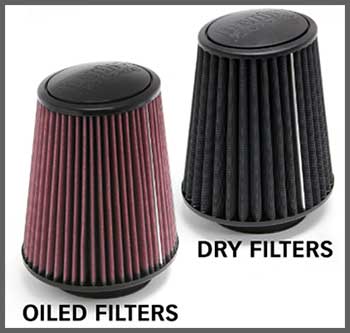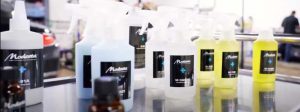When it comes to enhancing the performance of your vehicle, selecting the right air filter is crucial. The market is saturated with various options, but two popular choices are Banks dry filters and oiled filters.
In this article, we will dive into the world of Banks dry and oiled filters to help you make an informed decision about which one is right for your vehicle.
A Brief Comparison Table
| Feature | Banks Dry Filter | Banks Oiled Filter |
| Material | Synthetic Media | Cotton Gauze |
| Oiling Required | No | Yes |
| Maintenance | Easier | More frequent |
| Allergy-Friendly | Yes | No |
| Filtration Efficiency | Slightly lower | Superior |
| Potential MAF Sensor Issue | Lower risk | Higher risk |
| Lifespan | Shorter | Longer |
An Overview of Banks Dry and Oiled Filters

Before we delve deeper into the differences between Banks dry and oiled filters, it’s essential to understand the role of an air filter.
Air filters are designed to protect your engine from contaminants and debris, ensuring that only clean air reaches the combustion chamber.
This not only improves your vehicle’s performance but also extends the engine’s life.
- Banks Dry Filters
Banks dry filters are designed with synthetic media that doesn’t require oiling.
These filters offer excellent filtration performance and are easier to maintain than their oiled counterparts.
They are particularly popular among drivers who live in dusty environments or have allergies, as they don’t release oil particles into the air.
- Banks Oiled Filters
Banks oiled filters, on the other hand, use a cotton gauze material soaked in specially formulated filter oil. This combination allows the filter to capture more dirt and contaminants, ensuring maximum protection for your engine.
However, they require more frequent maintenance and proper oiling to keep them functioning at their best.
The Pros and Cons of Banks Dry Filters
Pros
- Ease of Maintenance: Banks dry filters are straightforward to clean and maintain. You can simply remove them, wash them with soap and water, and let them air dry. There’s no need to worry about oiling or the mess that comes with it.
- Allergy-Friendly: Dry filters are an excellent option for drivers who have allergies, as they don’t release oil particles into the air.
- Less Mess: Without the need for oil, there’s less chance of over-oiling and causing potential damage to your vehicle’s mass airflow (MAF) sensor.
Cons
- Slightly Lower Filtration Efficiency: Banks dry filters might not be as efficient in capturing smaller particles when compared to oiled filters. However, the difference is minimal and might not impact your engine’s performance significantly.
- More Frequent Replacement: Dry filters tend to have a shorter lifespan than oiled filters, so you may need to replace them more often.
The Pros and Cons of Banks Oiled Filters
Pros
- Superior Filtration: The oil in Banks oiled filters allows them to capture even the tiniest particles, ensuring maximum protection for your engine.
- Longer Lifespan: Oiled filters generally have a longer lifespan than dry filters, provided they are maintained properly.
Cons
- Higher Maintenance: Oiled filters require more frequent cleaning and proper oiling to maintain their performance.
- Potential for MAF Sensor Damage: Over-oiling an oiled filter can cause damage to your vehicle’s MAF sensor, leading to performance issues and costly repairs.
- Not Allergy-Friendly: Oiled filters can release oil particles into the air, which can be problematic for allergy sufferers.
Watch the quick comparison between the two.
Frequently Asked Questions (FAQ)
The choice between a dry or oiled air filter largely depends on your personal preferences, driving conditions, and maintenance habits. If you’re looking for an easy-to-maintain filter and suffer from allergies, a Banks dry filter might be the better option. If you prioritize maximum filtration and don’t mind the additional maintenance, an oiled filter could be a better choice.
Only Banks oiled filters require oiling. Banks dry filters are designed with synthetic media that doesn’t need oil, making them easier to maintain.
K&N oiled filters come pre-oiled and ready to use. However, after cleaning the filter during maintenance, you’ll need to apply the appropriate K&N filter oil before reinstalling it.
An oiled air filter uses a combination of cotton gauze material and specially formulated filter oil to capture more dirt and contaminants, providing maximum protection for your engine. The oil helps the filter to trap even the smallest particles, resulting in superior filtration performance.
No, you do not need to oil a dry air filter. Dry filters are made from synthetic media that doesn’t require oiling. They are designed to provide efficient filtration without the need for oil and are easier to maintain.
Also Read: Is CAT 1R-0749 Better Than CAT 1R-0750?
Conclusion
In summary, both Banks dry and oiled filters have their advantages and drawbacks. Choosing the right filter for your vehicle comes down to your personal preferences, driving conditions, and willingness to perform maintenance.
Banks dry filters are easier to maintain, allergy-friendly, and less messy. However, they might not offer the same level of filtration efficiency as oiled filters and may need more frequent replacement.
On the other hand, Banks oiled filters provide superior filtration and a longer lifespan but require more frequent cleaning and proper oiling. They are also not the best option for allergy sufferers.
Regardless of which filter you choose, it’s essential to follow the manufacturer’s guidelines for cleaning and maintenance to ensure your filter performs at its best and provides your engine with the protection it needs.



